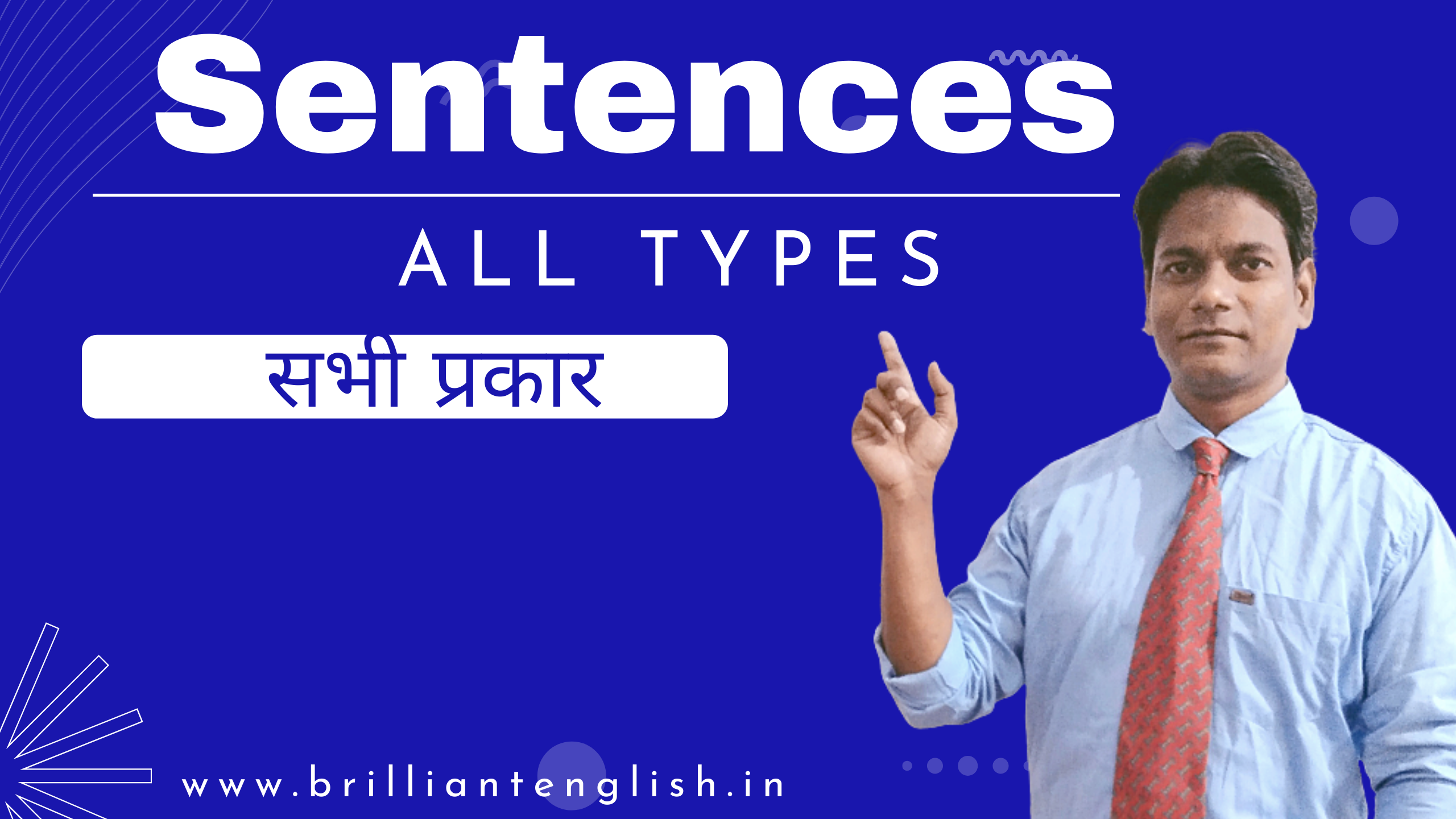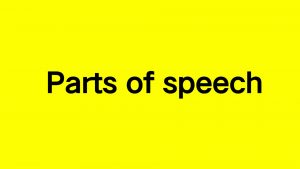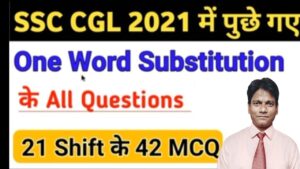A language can’t be completed without the usage of a sentence. It may be a sentence of two words or more than that. When you communicate with someone in any language of the world, you use a word or a sentence to interact with person to express your feelings, ideas or thoughts. ‘A sentence and its kinds’ this is what I will walk you through in this post.
Sentence and its kinds : Functional grammar
1. Introduction :
Definition :- A combination of words that makes a complete sense is said to be a SENTENCE:
“ऐसे शब्दों के समूह को जिसमें किसी बात की पूर्ण अभिव्यक्ति होती है, अंग्रेजी में Sentence (वाक्य) कहलाता है।”
अंग्रेजी में वाक्य की परिभाषाएं कुछ इस तरह है :-
“A sentence is a disciplined group of words followed by a pause and revealing an intelligible purpose.” _ Gardiner
As:-
Birbal was a great minister.
The police faught bravely.
The boys are playing football.
He came here yesterday.
What are you doing here ?
2. Kind of Sentences (वाक्य के भेद)
प्राचीन मत के अनुसार वाक्यों के निम्नलिखित भेद होते हैं :-
1. Assertive or Declarative Sentence:
ऐसे वाक्य जो किसी कथन या दृढ़ प्रतिज्ञा को व्यक्त करते हैं, वे Assertive Sentence कहलाते हैं। जैसे :-
Zain is a good boy.
Insha doesn’t read a newspaper.
He goes to the mosque every Friday.
Assertive के दो भेद होते हैं :-
a) Affirmative Sentence : इस वाक्य में किसी काम के होने का बोध होता है अर्थात् हाॅं शब्द का बोध होता है; जैसे :-
I read a book.
He goes to school.
The sky is blue.
b) Negative Sentence : इस वाक्य में किसी काम के नहीं होने का बोध होता है; जैसे :- He doesn’t go to church.
I don’t read a novel.
We are not poor.
You have not received money.
2. Interrogative Sentence
ऐसे वाक्य में जिनमें कोई प्रशन पूछा जाता है, interrogative sentence कहलाता है; जैसे :-
What is your name ?
Where do you live ?
What will he do ?
When are they going ?
Who has taken responsibility ?
How did you know that ?
3. Imperative sentence :
ऐसे वाक्य में जिनमें आज्ञा, प्रार्थना, निषेध तथा उपदेश आदि का बोध हो, imperative sentence कहलाता है; जैसे :-
Do not waste your time.
Please help me.
Be kind to the poor.
Go home.
4. Optative sentence:
ऐसे वाक्य में जिनमें इच्छा अथवा आशीर्वाद की भावना रहती है, Optative sentence कहलाता है : जैसे :-
God bless you.
May you live long.
Long live our freedom.
5. Exclamatory Sentence:
ऐसे वाक्य में जिनमें हर्ष-उललास, शोक-संताप, आश्चर्य, घृणा आदि प्रकार की आंतरिक भावनाओं का बोध हो, Exclamatory Sentence कहलाता है; जैसे :-
What a fine morning !
What a noise !
I wish you were rich !
What a pity !
Well done !
6. Emphatic Sentence :
ऐसे वाक्य में जिनमें कथन पर विषेश ज़ोर या बल (emphasis) डाला जाये, वह emphatic Sentence कहलाता है; जैसे :-
I do Play cricket.
She does sing well.
He did help me.
Do come tomorrow.
Kind of Sentences
आधुनिक मत के अनुसार वाक्यों के निम्नलिखित भेद होते हैं :-
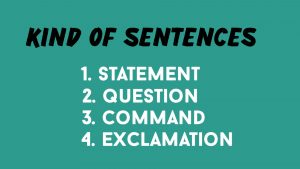
1. Statement ( assertive)
2. Question (interrogative)
3. Command (imperative)
4. Exclamation (Optative; exclamatory)
1. Statement
ऐसे वाक्य में किसी कथन का बोध होता है। वह कथन (statement) स्वीकारात्मक (हां) positive अथवा नकारात्मक (नहीं, ना) negative हो सकता है; जैसे :-
Positive statement
I operate a computer.
They go to market.
Radha sings a song.
He will come tomorrow.
Negative Statement
I don’t operate a computer.
They don’t go to market.
Radha doesn’t sing a song.
He won’t come tomorrow.
Change positive Sentences into Negative
Positive से negative अर्थात् Affirmative से Negative बनाने के निम्नलिखित नियम हैं :-
1. Verb ‘to be’ (= is, am, are, was, were etc.) का प्रयोग full verb अर्थात् स्वतंत्र रूप से हो, तो negative Statement बनाने में सिर्फ ‘not’ शब्द का प्रयोग होता है; जैसे :-
Madan is sad.
Madan is not sad.
We are happy.
We are not happy.
He was a good boy.
He was not a good boy.
They were good players.
They were not good players.
2. वाक्य के अंतर्गत जब ‘has, have, had’ का प्रयोग full verb के रूप में हो तो negative में ‘no’ के बाद किसी Noun का प्रयोग होता है; जैसे :-
I have money.
I have no money.
He has a book.
He has no book. Or he has not a book.
He had a parrot.
He had no parrot. Or he had not a parrot.
3. Auxiliary verb ( सहायक किया) का प्रयोग वाक्य के अंतर्गत होने पर सहायक क्रिया के बाद ‘not’ शब्द का प्रयोग Negative statement बनाने में होता है; जैसे :-
He is reading a book.
He is not reading a book.
Boys are playing.
Boys are not playing.
Girls were dancing.
Girls were not dancing.
4. Simple Present Tense (present indefinite)
a) इसमें first, second और third person के plural number के subject के साथ Negative statement में ‘do not’ शब्द का प्रयोग होता है और मुख्य क्रिया (principal verb) को मूल रूप (base= form: M.V¹) के रूप में रखा जाता है; जैसे:-
I read a book.
I do not read a book.
We go to school.
We do not go to school.
You make a noise.
You do not make a noise.
Boys do not play hockey in the field.
b) Simple present Tense में third person, singular number के subject के साथ ‘does not’ शब्द का प्रयोग Negative statement बनाने में होता है और मुख्य क्रिया(main verb) को मूल रूप (base form : M.V¹) में रखा जाता है; जैसे:-
He reads a story.
He does not read a story.
Sita cooks food.
Sita does not cook food.
Madan writes a letter.
Madan does not write a letter.
2. Question
Question: जिस वाक्य में कुछ प्रशन पूछा जाता है अथवा जिज्ञासा की जाती है उसे Question अथवा interrogative sentence कहा जाता है; जैसे :-
What is your name ?
Is this your book ?
What has Sonam done ?
Question के निम्नलिखित भेद होते हैं :-
1. Close 2. Open 3. Rhetorical 4. Indirect
1. जिस प्रश्न का उत्तर yes/No में दिया जाए उसे Closed Question कहा जाता है; जैसे :-
Are you a boy ? Yes, I am.
Do you speak English ? Yes, I do.
Are you reading ? No, I am not.
2. जिस प्रश्न का उत्तर yes/No में नहीं दिया जा सकता उसे Open Question कहा जाता है; जैसे :-
What’s your address ?
Who killed Mira ?
ऐसे प्रश्न interrogative words – what, which, when, how इत्यादि से शुरू होते हैं और इन्हें Question Words कहा जाता है।
3. ऐसे प्रश्न जिनके उत्तर अपेक्षित नहीं हो Rhetorical Question कहलाते हैं। जैसे:-
Who does not know Gandhiji ?
What is the use of regretting ?
4. Indirect speech में जो प्रश्न रहता है उसे indirect Question कहा जाता है। जैसे :-
Tell me why have you come to me
Ask him what he wants.
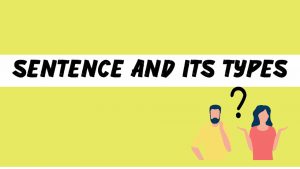
3. Commands : Imperative Sentences
Commands से आज्ञा, अनुरोध, परामर्श / (order, request, advice) का बोध होता है; इस प्रकार के वाक्यों में subject, second person (you) प्रायः छिपा रहता है; जैसे:-
Go there.
Stop it.
Hurry up !
Wait !
Stand up.
Commands :-
i) first person imperative का प्रयोग बिना ‘to’ (infinitive without- to ) के होता है; जैसे:-
Let’s wait for Zain. Let’s not tell it to anybody. Let me read.
ii) Third person imperative का प्रयोग इस प्रकार होता है। Let him go. Let him come. Let her cry. Let them go by train.
आधुनिक भाषा में ऊपर दिए वाक्यों का प्रयोग नहीं के बराबर होता है। Modern English में उन्हें इस प्रकार लिखा जाता है: –
He had better sleep.
They had better go by train.
They had better not go by bus.
He must sleep.
They must go by train.
They must not go by train.
iii) (a) Commands में प्रायः Obligation (कृतज्ञता) के रूप में must द्वारा उपदेश या आदेश (order/advice) ‘be +infinitive’ के द्वारा और लिखित निषेध (written Prohibition) ‘may not’ के द्वारा प्रकट किया जाता है, जैसे:-
You must not smoke in the office.
Dogs must be left loose in the night.
He is to report for duty at once.
Students may not bring books in the examination hall.
b) Request : Request form ( अनूरोध-रूप) को अनेक प्रकार के शब्दों द्वारा प्रकट किए जाते हैं; जैसे :- please/pray/Could you/Will you/Would you/(please)/if you would/I should/would be very grateful/if you would/would you be good/kind enough etc. as:-
Please let me go.
Lend me your pen, please.
Please, excuse me this time.
Could you tell me where Mr. Gupta lives ?
Will you have some more tea ?
Would you please post this letter ?
Would you mind signing this form ?
c) Advice : Advice form ( परामर्श रूप) को अनेक प्रकार से प्रकट किये जाते हैं। जैसे:- Must/ought to/should/you had better+ infinitive without to/if I were you should/would etc. as :-
You must keep your words.
You had better go by train.
If I were in your place, I would go for a new car. Why don’t you keep a servant ? It is time you bought a colour T.V.
Note :- It is time + infinitive प्रयोग का अर्थ है कि ठीक समय पहुंच गया है। It is time – subject + past tense का अर्थ है कि समय में कुछ विलम्ब हो गया है और इस बात पर ज़ोर देने के लिए high शब्द का प्रयोग किया जाता है; जैसे:-
It is time to start.
It is time to go to bed.
It is time we went.
It is high time we left.
4. Exclamation: Optative/ exclamatory
ऐसे वाक्य जिनमें हर्ष-उललास, शोक-संताप, विस्मय या आश्चर्य, घृणा इत्यादि आंतरिक भावनाओं (internal feelings of mind) का बोध हो, Exclamation या Exclamatory Sentence कहलाते हैं; जैसे:- What a fall ! What a dream! What a pity ! How sweet this rose smells ! How lovely it is ! Etc.
Note :-
1. a) what + noun. b) How + adjective/adverb द्वारा Exclamatory वाक्य बनते हैं।
2. निम्नलिखित interjections शब्द Exclamatory वाक्य में प्रयुक्त होते हैं।
Oh! अहा !
Alas ! हाय !
Ahme ! हाय ये भाग्य !
Shame ! लानत है !
Fie ! Fie ! छि
Great heavens ! हाय भगवान !
Well done ! ख़ूब किया !
Pooh ! राम-राम !
Bravo ! शाबाश !
Hip-Hip Hurrah ! हर्ष हर्ष जय हो !
Hush ! चुप-चुप !
A capital hit ! ख़ूब मारा !
Good heavens ! हाय भगवान !

